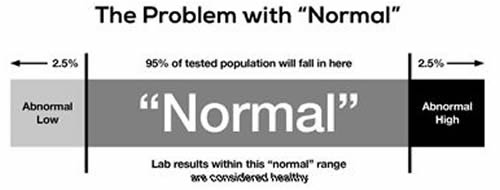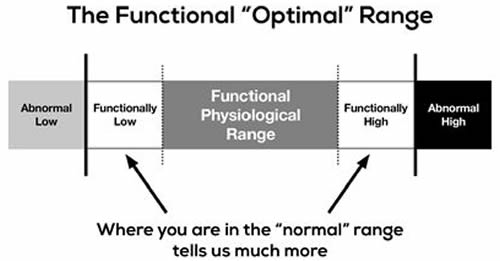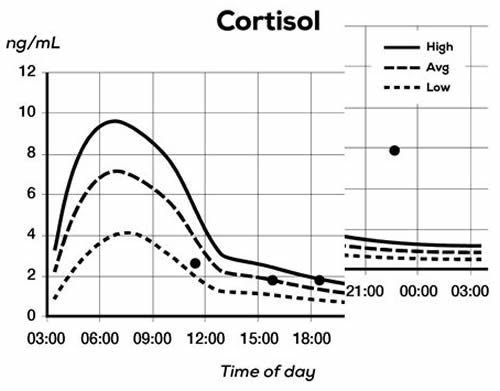Positive Health Online
Your Country

What Hormone Tests are Available and Why Women Could Need Them
listed in women's health, originally published in issue 273 - September 2021
Get Yourself Tested
Hormones work to the ‘Goldilocks principle’ – not too much, not too little, but just right. This is why the ‘one size fits all’ standard medical approach doesn’t work for everyone, and why it’s important to get personalized treatment from an expert who can test you properly.
When I work with clients, I take a full medical history and go through all their symptoms. That usually gives me a good idea about what their hormones are up to. But symptoms are just an indication, and sometimes there are underlying factors that may not be so obvious. That’s when testing is so useful for me in clinic.
Testing takes out the guesswork. Even though I’m pretty intuitive when it comes to hormones, I like to have the backup of a physical test – because I’m not infallible, and I want the absolute best for my clients – so if I know FOR SURE that something isn’t where it should be, then I can put a protocol in place that laser targets that specific imbalance – and that helps in three ways:
- The client will get much quicker and more effective results – after all, that’s what we’re aiming for!
- It helps the client stick to the programme. It’s all well and good me telling them they have a problem, but seeing it on paper makes it REAL
- It gives us a baseline so we can measure the client’s progress from beginning to end
‘Normal’ or Optimal?
Many clients report that they have had tests done by their doctors and have been told they are ‘normal’.
What I often find when I look at the results is that they have fallen into the ‘normal’ range, however, at the very low end.

If you fall within the normal range, the computer will not flag up your results as needing any action. I hope that most doctors will look through the results anyway and spot any low (but ‘normal’) readings, but I suspect that many don’t get time to do a thorough check.
Unfortunately there’s a huge difference between someone with optimal TSH (thyroid stimulating hormone) and someone with a level that is just within range. Or someone with ferritin (iron) at the low end of the range and someone with optimal levels. It will most often show up in their symptoms.

If you ask me, I’d be wanting OPTIMAL levels not ‘normal’ levels! That’s how I work with my clients. Getting them to optimal. It makes a huge difference to their well-being.
Cortisol Testing
As I explained in Chapter 3, chronic stress is at an epidemic levels in modern-day society, and this can take a toll on your adrenal glands. A cortisol imbalance over the long term can have serious implications for your health, including cardiovascular, hormones, digestion, neurological and immune function. Your doctor may test your cortisol levels but it is not a standard test. If your doctor suspects very low or very high levels, he may order a blood test that measures your cortisol levels in the morning. They may be looking for abnormally low levels, which could indicate a serious condition called Addison’s disease. They are not looking to measure how well your adrenals are coping over the course of your day. ‘Adrenal fatigue’ or cortisol imbalance is not a recognized condition in conventional medicine.
Even if you do get your cortisol tested, measuring morning cortisol is not a great way of assessing adrenal health. Your cortisol may be raised if you are rushing to a blood test facility
before the school run or work. Measuring cortisol in blood is not the most accurate measure either. And only taking a snapshot of one moment in time is not showing you the pattern of cortisol output during the day.
The alternative? We use a urine test to measure cortisol levels over 4 points in a 24-hour day to check how much cortisol you’re producing and what the pattern is. This tells us a huge amount about how your adrenals are coping with any stress you are under – whether that’s external stress in your daily life, or internal stress like an underlying infection, hormone imbalance or nutrient deficiency.
It also measures your DHEA, which helps to balance out cortisol, so if you’re low (or high) it can indicate adrenal stress.

This is a typical adrenal test result. Cortisol should be high in the morning to wake you up, and then taper off during the day with low levels in the evening to prepare for sleep. As you can see, this client’s cortisol production was a bit back to front, and she had high levels in the evening preventing her from getting off to sleep at night.
Who Might Benefit from an Adrenal Stress Test?
Anyone who has the following symptoms: anxiety, overwhelm, irritability, feeling wired, poor sleep, brain fog, memory loss, digestive issues, frequent colds/infections, PMS, depression, low libido, high blood pressure, palpitations, infertility and belly fat.
Thyroid Testing
As you saw in Chapter 3, your thyroid hormone is vital for every cell in the body to make the energy required for it to do its job – whether that’s making your heart beat, your muscles work or your brain function properly!
Doctors in general are quite happy to test your thyroid, especially if you have symptoms of fatigue, weight gain, hair loss or have a family history. They will often measure your TSH, T4 and sometimes your thyroid antibodies. These are all important, but they don’t always show the whole picture.
Remember the thyroid pathway in Chapter 3? TSH and T4 are just the start of it:
- TSH is your thyroid-stimulating hormone – released from the pituitary gland in the brain to tell the thyroid gland how much T4 hormone to make
- T4 is the inactive hormone that gets converted to T3, your active hormone
- T3 is the one that does all the work, and this is often not measured
- RT3 is Reverse T3, produced to inhibit T3 function
- TPO (thyroid peroxidase) and Tg (thyroglobulin) antibodies – these are the antibodies that target parts of your thyroid gland or receptors
There are Three Main Problems with Standard Thyroid Testing:
- A Very Wide Reference Range
The reference ranges for thyroid hormones are very wide. That means that you could be ‘normal’ even though you are at the lowest end of the scale. Unless you dip under the threshold you won’t get any treatment. This is known as ‘subclinical’ hypothyroidism and there is much debate about how or even whether it should be treated. Similar to adrenal function, thyroid disease is often only recognized as overt hyperthyroidism and overt hypothyroidism. The thresholds for these diagnoses are:
- Hyperthyroid – low TSH (almost undetectable) and high T4;
- Hypothyroid – high TSH (in the UK typically above 4 or 5mU/L) and/or low T4.
If you are producing too much TSH, it indicates that the body doesn’t have enough T4 or T3 and is signalling the pituitary to produce more; so more TSH is released. This is a hypothyroid condition, and is the most common of the two.
There are many differing views on the lowest reference range for TSH and this is reflected in the variety of lab ranges across the world. Here in the UK, you could have a TSH of just under 5mU/L and be diagnosed ‘normal’. However, many health practitioners like to see TSH levels below 2.5 for optimal health, corresponding with published guidelines for pregnant women.
- It’s Not the Whole Picture
The standard initial test for thyroid will sometimes only measure TSH levels. Often T4 is measured though not always in its free form (fT4). It’s really important to know your free T4 and free T3 levels but these won’t necessarily be measured if your TSH is ‘normal’. This testing process only looks at a small part of the HPT axis and doesn’t take into account what may be happening further down the chain (e.g. if your T4 is not converting to T3, or you have high antibodies indicating an autoimmune condition).
- No Interest in the Cause
If you have low thyroid function, it is vital to know if it is autoimmune related. Around 80% of thyroid disease cases are due to autoimmune Hashimoto’s or Graves’ disease. Autoimmune thyroid conditions have a different aetiology than other thyroid issues, and so require a different protocol of treatment. Many people are just put on thyroxine, not knowing they have an immune disorder and how to treat it.
If you suspect you may have a thyroid issue, make sure you ask your doctor for all available thyroid measures; TSH, fT4, fT3, and TPO antibodies.
Testing your body temperature at home can be a good initial indication of low thyroid – see Home Thyroid Test in the Resources section. It’s sometimes useful to take your results to your doctor if you’re trying to get tests done.
The alternative? A full thyroid hormone panel is my standard test for my clients. It includes TSH, fT4, fT3 and TPO antibodies. That way, if there is a problem I can see where in the chain it’s likely to be occurring and put in place the right protocol to address it. I will also measure RT3 separately if results come back normal and symptoms persist.
Who Might Benefit from a Full Thyroid Panel?
- Anyone who has the following symptoms:
fatigue, weight gain, anxiety, depression, cold hands/feet, brain fog, memory loss, constipation, PMS, infertility, low libido, hair loss, poor nails, dry skin, joint pain, high cholesterol. - Women over 40 and anyone with a family history of thyroid disease are at a higher risk.
Sex Hormone Testing
From the age of 35 a woman’s sex hormones start to decline (and fluctuate). These are the peri-menopausal years and they can last up to post-menopause (average age 51). Some women sail through this time, but for many it can be a roller coaster. If you have symptoms in your 40s, your Doctor may get your FSH (Follicle Stimulating Hormone) and LH (Luteinizing Hormone) levels tested. If these are raised it can indicate that you are in the peri-menopause. Not that useful as you probably know that already!
You may also get your oestradiol and sometimes progesterone tested and, if low, HRT (hormone replacement therapy) may be recommended.
Before you opt for HRT, please read Chapter 12 [from It's Not You, It's Your Hormones.] on BHRT (bio- identical hormone replacement) so that you can start doing your own research and make an informed decision that’s right for you.
Test Alternatives? We use in my opinion the best hormone test in the world! It’s a dried urine test that not only measures your sex hormone levels but also the metabolites, which gives us a picture of how hormones are actually performing, and crucially how they are being detoxified and eliminated. This is very useful in understanding the behaviour of oestrogen in the body and potential risks of further conditions, including breast and ovarian cancer.
Who might Benefit from a Sex Hormone Panel?
- Anyone who has the following symptoms:
Fatigue, weight gain, anxiety, depression, hot flushes, night sweats, brain fog, memory loss, over-emotional, PMS, heavy/painful periods, breast tenderness, dry skin, vaginal dryness. - In addition, this test can be useful for anyone with a hormone- driven condition, such as PCOS, endometriosis, fibroids and hormone-associated cancers.
Gut Testing
Stool testing has come a long way in recent years. We use a test that utilizes cutting-edge technology to provide a true DNA- based assessment of your gut microbiome from a single stool sample.
Who might Benefit from a Gut Test?
- Anyone with the following symptoms;
IBS, bloating, constipation, diarrhoea, flatulence, indigestion, acid reflux, pain or cramps. - Or other systemic symptoms which may be caused by digestive imbalances such as the following:
migraines, fatigue, brain fog, feeling hungover, depression, anxiety, joint pain, cravings or unexplained weight gain. - Or you have been diagnosed with any of the following:
IBS, Crohn’s disease, Ulcerative Colitis, Diverticulitis, Colitis or any other inflammatory bowel condition.
Blood Tests
Blood testing is most commonly used to detect any health issues relating to blood chemistry, complete blood count, heart, liver, kidney, key nutrients such as vitamin D, B12, ferritin and folate. Also available as standard medical tests are thyroid hormones, as well as key markers for diabetes and inflammation.
There are some limitations however with standard blood testing;
- Reference ranges can be wide so you want to be looking for optimal levels not just ‘normal’.
- Some nutrients are not routinely tested such as vitamin D, vitamin B12, iron and folate.
- Thyroid testing is often limited to TSH and T4, not the full pathway.
Private blood testing is an alternative way to get a more comprehensive picture, but you must ensure you get professional help to interpret your results.
If you’re interested in discussing testing further please contact us via the website: www.happyhormonesforlife.com/contact
Summary
- Comprehensive testing can often provide the missing piece of the jigsaw.
- Look for optimal not normal when looking at results.
- Useful hormone tests include cortisol, DHEA, a full thyroid panel, vitamin D and all 3 sex hormones.
Acknowledgment Citation
Extracted with Permission from Nicki Williams. It's Not You, It's Your Hormones. Practical Inspiration Publishing. Great Britain. ISBN 978-1-910056-53-0. 2017 (Updated 2021).
Comments:
-
No Article Comments available